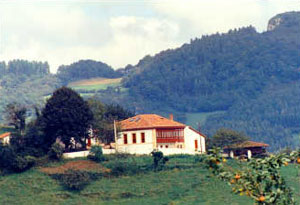
Saturday morning I arose quite (in-the-dark) early so I could squeeze in a run with Levon on the San Pedro beach before the hordes of August vacationers descended (the arrival of this summer swarm of humanity has occasioned the appearance at San Pedro of several new "PERROS PROHIBIDOS"--"DOGS PROHIBITED"--signs, so these days I have to get in and out before anyone's the wiser).
As we drove up the steep incline from the Molino, and then sped along the road that winds through the forest and fields before reaching Oviñana, the nearby town, my scheme was thwarted--temporarily, at least.
Since taking over the Molino nearly two years ago, various locals had spoken of a jabalí, or wild boar, that stalked the woods surrounding our place in the nocturnal hours. We had never seen this creature, however, and so had thought little of the rumors. Today that changed.
Smugly anticipating the empty beach ahead, I was stopped short as the car's headlights caught not one, not two, not three, but four jabalí, walking leisurely in a pack along the road ahead.
The sight alone startled me and got Levon, who was sprawled sleepily across the back seat, up on all fours, hackles raised. But I was further astonished when the group turned and began--fearlessly, almost curiously--to approach the car.
As the jabalí surrounded us, I had visions of an ugly, sensational, and most unexpected demise. My instinct was to gun the engine and get past these brutes, but I didn't really want to run one over (both for fear of raising the ire of the others, and because I was technically outside the limits of the nearby hunting zone and would have no justification for my actions later, should I need it).
For a very long three minutes, I sat still, mostly listening as the beasts brushed along the front, sides, and back of the car, only occasionally glimpsing their raised dorsal bristles through the windows.
Finally, they reappeared as a group a few feet in front of the car and, as if following a practiced routine, turned as one and trotted off the road through a gap in the brush to the left.
After a brief pause, during which I thought with regret how I had nearly brought my camera to get a shot of the sun's first appearance at the beach, I put the car in gear, and we proceeded, still in darkness, to San Pedro.




















